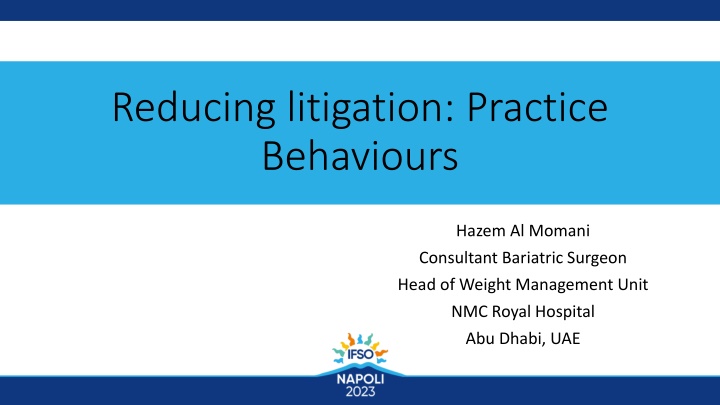
Reducing Medical Litigation: Important Tips for Surgeons
Learn how to reduce medical litigation as a surgeon by following key tips such as understanding laws, sticking to your expertise, staying updated with knowledge, and ensuring active liability policies. Discover the impact of medical litigation, common claims against surgeons, and the cost implications. Expert insights shared by Consultant Bariatric Surgeon Hazem Al Momani.
Download Presentation

Please find below an Image/Link to download the presentation.
The content on the website is provided AS IS for your information and personal use only. It may not be sold, licensed, or shared on other websites without obtaining consent from the author. If you encounter any issues during the download, it is possible that the publisher has removed the file from their server.
You are allowed to download the files provided on this website for personal or commercial use, subject to the condition that they are used lawfully. All files are the property of their respective owners.
The content on the website is provided AS IS for your information and personal use only. It may not be sold, licensed, or shared on other websites without obtaining consent from the author.
E N D
Presentation Transcript
Reducing litigation: Practice Behaviours Hazem Al Momani Consultant Bariatric Surgeon Head of Weight Management Unit NMC Royal Hospital Abu Dhabi, UAE
Case Mix 1% 21% LSG RYGB 19% 61% Revisional LAGB
Disclosure Received honoraria and participated in Advisory Board meetings: Johnson & Johnson / Ethicon Medtronic Novo Nordisk Ezisurg Medical Vector Medical Algorithm
Medical Litigation: Cost The NHS paid 2.4bn ( 2.8bn; $3.1bn) in clinical negligence claims in 2018-19 This sum equates to about 2% of the entire budget for the NHS in England 83.4bn set aside to account for future claims US Department of Health and Human Services (1990 - 2020): $151,674,570,000
Medical litigation: Speciality Claims against General Surgeons are the third commonest ones Claims against General Surgeons have the highest compensation rates
Tip #1: Know the Laws of the Land Familiarise yourself with the rules and regulations of the place you practice within Make sure all your paperwork is in place (Physician, Hospital, Clinic ) Always follow the standards set by your hospital, regulatory body
Tip #2: Stick to what you know Deliver treatments/service according to your ability and expertise Don t be a maverick Back up any care you deliver with supportive evidence to demonstrate your competency/knowledge
Tip #4: Make sure that your medical liability policy is active
Tip #5: Build a good relationship with your patients Happy patients are less litigious patients Be transparent and keep your integrity Show Empathy Always involve the patient (and any one the patient wants) with the decision making
Tip #6: Communicate clearly Use written and visual educational material Keep these material up to date Give patients/families space to ask questions Always follow up with your patients/their families
Tip #8: Document, document, document If it is not documented, it never happened Make sure that your documentation is accurate and done in a timely manner Never alter medical records
Tip #9: Beware of electronic medical records Check, check, check and double check
Tip #10: Park your ego aside Seek help at an early stage Involve other colleagues in the management and care delivered to your patient whenever the need arise If you don t know: ASK!!
Tip #12: Always be prepared to apologise Genuine apology and expression of sympathy and acceptance of the error by the doctor encourage patients to be more forgiving Many US states now have physician apology laws that enable a doctor to make an apology without being concerned about it being used against him/her later in a medical malpractice suit Take responsibility for your actions/decisions
Tip #13: Always reflect on your experience Turn your experience into a learning opportunity to yourself and other colleagues Present your experience in departmental meetings, M&M meetings or other educational meetings: This show professionalism and sincerity Always ask for feedback: Medical and Legal
Tip #14: Look after yourself/your team Healthcare Professionals are more likely to experience stress and anxiety during and/after litigations Behavioural changes after litigation: Defensive medicine Extra/unnecessary testing Patient selection More detailed documentation Role of management and Healthcare institutes


